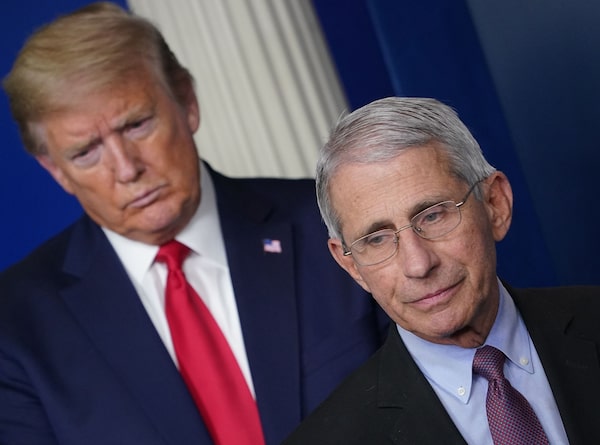
Peter Navarro wrote that Dr. Fauci, pictured here on on April 22, 2020, fought U.S. President Donald Trump’s decision to stop flights from China, which is not true.MANDEL NGAN/AFP/Getty Images
Earlier this week, USA Today published a catastrophically stupid op-ed by top White House trade adviser Peter Navarro, who told the public that Dr. Anthony Fauci “has been wrong about everything I have interacted with him on.” Mr. Navarro wrote that Dr. Fauci fought U.S. President Donald Trump’s decision to stop flights from China (which is not true), that Dr. Fauci flip-flopped on masks (which is fair) and that Dr. Fauci refuses to acknowledge that the falling death rate in the U.S. (which isn’t falling anymore) should green-light further economic reopening.
“When you ask me whether I listen to Dr. Fauci’s advice,” Mr. Navarro wrote of the country’s top infectious disease expert, “my answer is: only with skepticism and caution.”
In normal times, this sort of critical, if error-laden op-ed would be a mostly benign drive-by of a prominent public servant. But at a time when refrigerated trucks are again being called to hold the dead in states that did not yield to public health advice, it’s a dare for the country to continue on the path to suicide. Mr. Navarro’s implication is that America has suffered throughout the COVID-19 pandemic for heeding to Dr. Fauci’s advice, though the evidence shows that many of the states now in acute crisis are suffering precisely because they did not.
The United States’ harrowingly inept response to its coronavirus outbreak can be traced to a number of systemic failures, including its labyrinthine health care system, its initial botched testing scheme, its derelict preparation efforts and so forth. But a major factor in this recent surge of infections – particularly in states such as Florida, Texas, Arizona and California – is cultural: a fierce sense of individualism and a national identity defined by values of personal freedom, liberty and choice.
Viewed through that lens, an economic shutdown is not simply an unfortunate, if necessary, collective measure to control the spread of a deadly virus. It is an affront to principles of what it means to live in what is supposedly the freest country on earth – an affront so egregious that armed protesters will storm a state capitol building to demand an end to emergency orders. Mask-wearing, similarly, has been seen by some Americans as not merely a tool to help stop the spread of a virus, but a political symbol, an indication of weakness and even a sign of mass conformity. Indeed, according to a CBS News poll back in May, 45 per cent of respondents who rarely wore masks cited their “freedom of choice” as their primary reason.
These notions surely sound incredibly bizarre to people in countries where social cohesion and collectivism is more the norm – countries such as South Korea, Taiwan and Vietnam, for example, which have been remarkably successful in controlling their COVID-19 outbreaks. Indeed, the populations there have by-and-large acquiesced to their experts’ instructions, and the results in containing the virus over the last few months have been profound.
Granted, deference to authority has not been a panacea: these countries also stockpiled supplies (Taiwan), tested early and widely (South Korea) and mobilized mass communication campaigns (Vietnam). It’s also true that mask-wearing was already more ingrained in their cultural ethos, and it’s not particularly difficult to have widespread compliance in a country like Vietnam, which is run by an authoritarian government.
But even citizens of democratic Taiwan and South Korea yielded rather quickly to intrusive new virus containment measures such as contact-tracing programs that employed CCTV surveillance and GPS location data. Canadians, who are probably midway on the individualism spectrum between the Americans on one end and the Taiwanese on the other, likely wouldn’t have accepted that sort of privacy intrusion so easily.
There are virtues to a culture of rugged individualism, but controlling the spread of a virus – which necessitates collective action – is not one of them. Canada, to our good fortune, appears to have found itself in something of a sweet spot. We are not afraid to constructively criticize our experts, especially and deservedly when their lethargy and mixed messages have arguably cost lives, but politics hasn’t infected our COVID-19 response to the extent that the question of staying home becomes a matter of partisan allegiance. Contact-tracing apps still make us queasy and rightfully raise eyebrows on privacy, but the majority of us are readily adopting new behaviours such as wearing masks in public.
The U.S., on the other hand, is struggling to find a balance between a culture that extols principles of freedom and independence, with the acute needs of an overburdened health care system that can’t afford any more rogue activities. The systemic issues plaguing the U.S. pandemic response can conceivably be fixed, but the cultural ones might be too ingrained to resolve within a meaningful timeline. And certainly, implicitly instructing USA Today readers not to listen to the face of the country’s COVID-19 response definitely is not helping.
Keep your Opinions sharp and informed. Get the Opinion newsletter. Sign up today.
 Robyn Urback
Robyn Urback